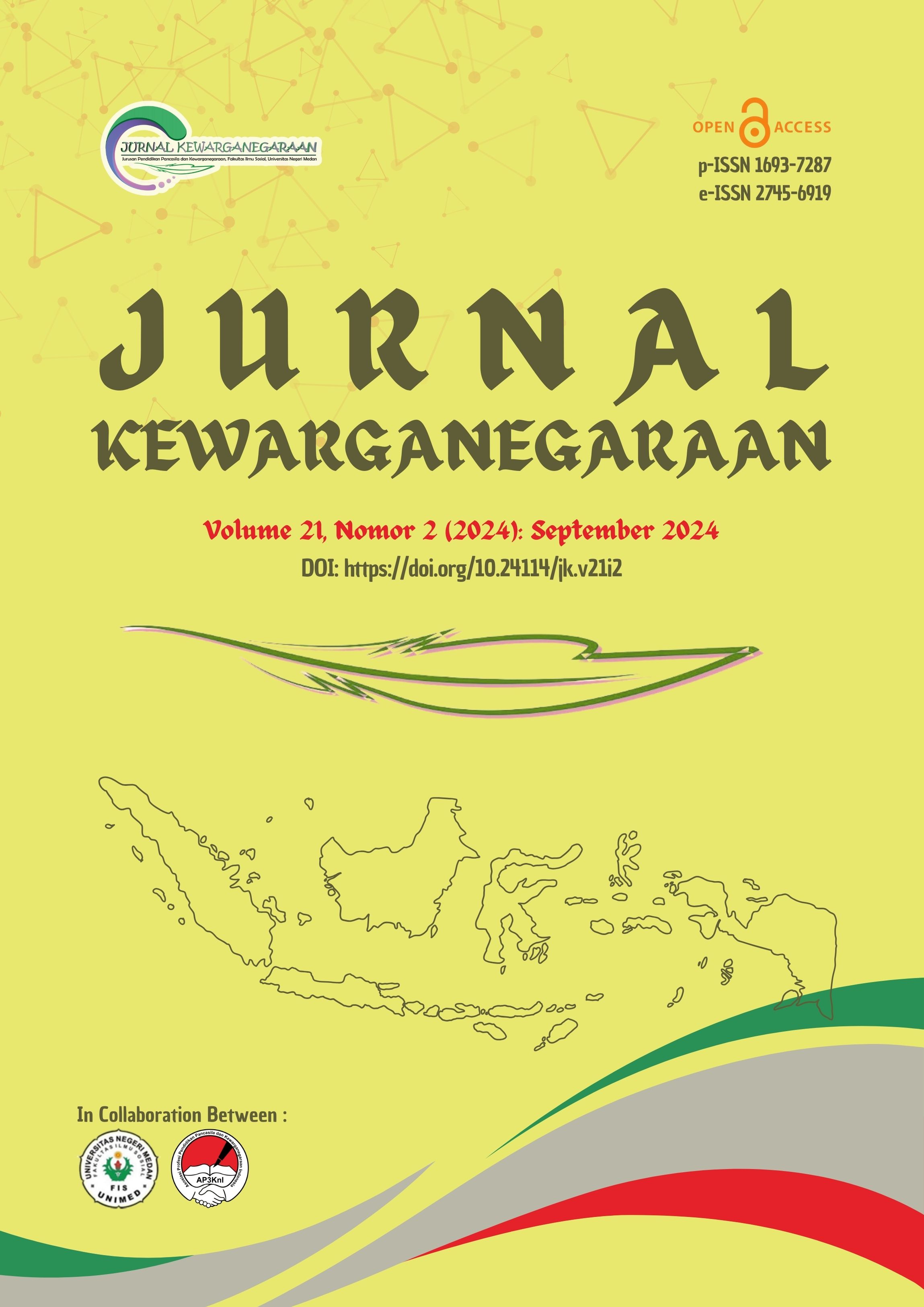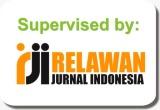Tata Kelola Demokrasi: Membangkitkan Semangat Pengawasan, Pengetahuan, Kesadaran, dan Partisipasi Politik Mahasiswa Melalui Program Sosialisasi
DOI:
https://doi.org/10.24114/jk.v21i2.61204Keywords:
Election Supervision, Socialization of Election Supervision, Political Awareness, Pengawasan Pemilu, Sosialisasi Pengawasan Pemilu, Kesadaran Politik.Abstract
AbstractThe research method used in this research is associative quantitative research. The population of this study were all students of San Agustin Hippo Catholic University who participated in the election monitoring socialization program in 2023, totaling 207 people. From statistical analysis, it appears that most students show a high level of involvement and participation in election monitoring and the political process, The results showed that the correlation coefficient based on student gender and student election monitoring political awareness with a Pearson correlation value of -0.291. To answer the data hypothesis test, the researcher compared the r table with df 51, and the r value of the data was 0.228. So based on these results, Ha is accepted if the Pearson product-moment correlation coefficient value is greater than r table.The results showed a correlation coefficient of 0.577. This means that the higher the level of political awareness of student election supervision, the higher the level of political participation in student election supervision. -----------------------AbstrakMetode penelitian yang digunakan dalam penelitian ini merupakan penelitian kuantitatif asosiatif. Populasi penelitian ini adalah seluruh mahasiswa Universitas Katolik San Agustin Hippo yang mengikuti program sosialisasi pemantauan pemilu tahun 2023 yang berjumlah 207 orang. Dari analisis statistik, terlihat bahwa sebagian besar mahasiswa menunjukkan tingkat keterlibatan dan partisipasi yang tinggi dalam pengawasan pemilu dan proses politik, Hasil penelitian menunjukkan bahwa koefisien korelasi berdasarkan gender mahasiswa dan kesadaran politik pengawasan pemilu mahasiswa dengan nilai korelasi Pearson sebesar -0,291. Untuk menjawab uji hipotesis data tersebut, peneliti membandingkan r tabel dengan df 51, dan nilai r data tersebut adalah 0,228. Maka berdasarkan hasil tersebut maka Ha diterima jika nilai koefisien product-moment korelasi Pearson lebih besar dari r tabel .Hasil penelitian menunjukkan koefisien korelasi sebesar 0,577. Artinya semakin tinggi tingkat kesadaran politik Pengawasan Pemilu mahasiswa maka akan semakin tinggi pula tingkat partisipasi politik Pengawasan Pemilu mahasiswa tersebut.References
Awaluddin. (2019). Mengapa Pendidikan Politik Elektoral Penting? Respon Penyelenggaraan Pemilu 2019. JUPE: Jurnal Pendidikan Mandala, 4(4), 111“116. https://doi.org/10.58258/jupe.v4i4.698
Ballard, P. J., Hoyt, L. T., Yazdani, N., Kornbluh, M., Cohen, A. K., Davis, A. L., & Hagan, M. J. (2022). Election-related Sociopolitical Stress and Coping Among College Students in the United States. Journal of American College Health, 1“11. https://doi.org/10.1080/07448481.2022.2117556
Chadjipadelis, T., Sotiroglou, M., & Papaoikonomou, A. (2020). Teaching Democracy: Tools and Methods in the Secondary Education. International Journal of Educational Research Review, 5(4), 380“388. https://doi.org/10.24331/ijere.768954
Dassonneville, R., & Kostelka, F. (2021). The Cultural Sources of the Gender Gap in Voter Turnout. British Journal of Political Science, 51(3), 1040“1061. https://doi.org/10.1017/S0007123419000644
Dewi, L. Y., Sinaga, H. L. N., Pratiwi, N. A., & Widiyasono, N. (2022). Analisis Peran Komisi Pemilihan Umum (KPU) dalam Partisipasi Politik Masyarakat di Pilkada serta Meminimalisir Golput. Jurnal Ilmu Politik dan Pemerintahan, 8(1), 36“48. https://doi.org/10.37058/jipp.v8i1.4082
Djumadin, Z. (2021). Student Political Participation and the Future of Democracy in Indonesia. Al-Ishlah: Jurnal Pendidikan, 13(3), 2399“2408. https://doi.org/10.35445/alishlah.v13i3.1438
Hidayah, Y., Sapriya, Darmawan, C., & Malihah, E. (2020). Reformulating Civic Education as Political Education in Indonesia in the Convergence Era. Proceedings of the 2nd Annual Civic Education Conference (ACEC 2019), 367“375. https://doi.org/10.2991/assehr.k.200320.070
Irwan, A. I. U., Fauzi, E. A., & Jalianery, J. (2023). Sosialisasi Pemilu Sebagai Strategi Alternatif Meningkatkan Kesadaran Politik Pemilih Pemula Pada Pemilu 2024. Jurnal Masyarakat Madani Indonesia, 2(4), 522“528. https://doi.org/10.59025/js.v2i4.178
Kenna, J. L., & Hensley, M. A. (2019). Utilizing Social Media to Promote Civic Engagement in the Social Studies Classroom. The Social Studies, 110(2), 86“94. https://doi.org/10.1080/00377996.2018.1524360
Kiess, J. (2022). Learning by Doing: The Impact of Experiencing Democracy in Education on Political Rrust and Participation. Politics, 42(1), 75“94. https://doi.org/10.1177/0263395721990287
Kılıçoglu, A. (2018). Qualitative Research for Educational Science Researchers: A Review of an Introduction to Qualitative Research. The Quantitative Report, 23(4), 949“951. https://doi.org/10.17613/M6VG47
Nabella, & Adnan, M. F. (2020). Implementation of Campaign Governance, Voting and Vote Counting in Regional Head Elections. Proceedings of the International Conference on Public Administration, Policy and Governance (ICPAPG 2019), 106“113. https://doi.org/10.2991/aebmr.k.200305.187
Perdana, A., & Hillman, B. (2020). Quotas and ballots: The impact of positive action policies on women™s representation in Indonesia. Asia & the Pacific Policy Studies, 7(2), 158“170. https://doi.org/10.1002/app5.299
Rosenbaum, J. E. (2021). Associations between Civic Engagement and Community College Completion in a Nationally Representative Sample of Young Adults. Community College Journal of Research and Practice, 45(7), 479“497. https://doi.org/10.1080/10668926.2020.1724574
Roussias, N., & Ruiz-Rufino, R. (2018). œTying Incumbents™™ Hands: The Effects of Election Monitoring on Electoral outcomes. Electoral Studies, 54, 116“127. https://doi.org/10.1016/j.electstud.2018.05.005
Subroto, W. (2021). Analysis of the Effectiveness of the General Election Commission™s Socialization as a Media for Political Education to Create a Democratic Society. International Journal of Science and Society, 3(3), 405“416. https://doi.org/10.54783/ijsoc.v3i3.386
Tumanov, A., Sabanaev, A., Solovyov, A., & Tumanov, V. (2020). Statistical Testing of Hypotheses About the Form of the Factor Law of Influence by the Kolmogorov Criterion. Journal of Physics: Conference Series, 1614(1), 012082“012082. https://doi.org/10.1088/1742-6596/1614/1/012082
Ugwonna, G. O., Ezeudu, S. A., Nwaubani, O. O., Aroh, P. N., Ezema, L. C., Ome, S. O., ¦ Nwokenna, E. N. (2020). Enhancing Voter Education Knowledge of Adolescents Through Social Interaction Instructional Models. Global Journal of Health Science, 12(5), 139“152. https://doi.org/10.5539/gjhs.v12n5p139
Yang, Y., Xia, N., Ahmad, Z. Bin, Jawan, J. A., & Talib, A. T. (2018). Undergraduates™ Political Participation Behaviors in Public Universities of Hebei Province, China. Asian Social Science, 14(8), 132“144. https://doi.org/10.5539/ass.v14n8p132
Downloads
Published
Issue
Section
License
Copyright (c) 2024 Apolonius Yonas, Oxtapianus Tawarik, Sapomo, Pebrianus Hendri

This work is licensed under a Creative Commons Attribution-ShareAlike 4.0 International License.
Authors published with the Jurnal Kewarganegaraan agree to the following terms:
- Authors retain copyright and grant the journal the right of first publication with the work simultaneously licensed under a Creative Commons Attribution License (CC BY-SA 4.0) that allows others to share the work with an acknowledgment of the work's authorship and initial publication in this journal.
- Authors are able to enter into separate, additional contractual arrangements for the non-exclusive distribution of the journal's published version of the work (e.g., post it to an institutional repository or publish it in a book), with an acknowledgment of its initial publication in this journal.
- Authors are permitted and encouraged to post their work online (e.g., in institutional repositories or on their website) prior to and during the submission process, as it can lead to productive exchanges, as well as earlier and greater citation of published work. (See The Effect of Open Access)
Licence

Jurnal Kewarganegaraan is licensed under a Creative Commons Attribution-ShareAlike 4.0 International License.








